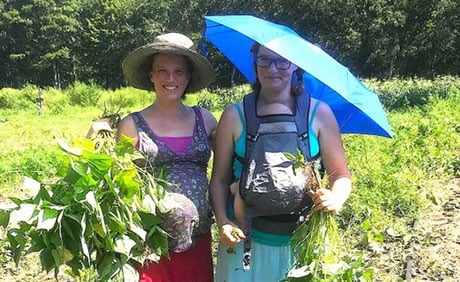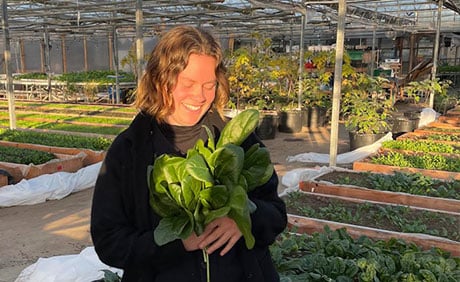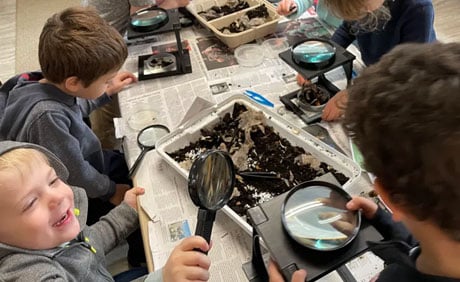2023 Community Impact Grant Recipients
Martha’s Vineyard Bank Charitable Foundation has announced the Community Impact Grant recipients for 2023. A total of $20,000 was awarded to four organizations, two on Martha’s Vineyard and two in Falmouth, each receiving a $5,000 grant.
From supplying our most vulnerable neighbors with freshly grown food to nurturing our children with fun and formative experiences, these four non-profits are making a real difference in the quality of life in our communities. Thanks to everyone who voted for these amazing changemakers!
And the recipients are...

Farming
Falmouth
Seeing a growing need, Farming Falmouth has decided to create a Service Garden on Andrews Farm, with the support of Geoff Andrews. All of the food grown in this garden will be donated to the Falmouth Service Center.
“Food grown right here – that hasn’t traveled long distances – is as fresh and nutritious as it gets,” says field manager Jeny Christian. “We want as many people to have access to it as possible.”
Recipient's Essay
Farming Falmouth
We are Farming Falmouth — and we believe in good food for all.
In the summer of 2020, Katrina Nevin, a board member of Farming Falmouth, was volunteering at a local farm and noticing how surplus produce was sometimes left behind in the field. As Katrina tells it,
“It seemed a shame to waste good food when there are so many people who need it… It wasn’t as if there was anything wrong with the food. It was simply a matter of the farmer’s time — it wasn’t always possible for him to pick the last of a crop in a field when a new crop needed to be planted.”
With the farmer’s cooperation, Katrina began a Gleaning Program to collect ripe vegetables and fruits, and quickly deliver them to the Falmouth Service Center for distribution to their clients. Many hands make light work! Thanks to our volunteers, more than 10,000 pounds of strawberries, eggplants, zucchini, peppers, squash, kale, pumpkins, beans, and carrots have since been donated to the Service Center. And all within an hour of harvest.
Share Your Bounty is another way that Farming Falmouth collects surplus produce for the Service Center. This program invites backyard growers to donate their extra vegetables by dropping them off at the weekly Falmouth Farmers’ Market. Our Community Gardens at Andrews Farm and at Emerald House are making contributions too. In fact some generous gardeners have dedicated their entire plots to growing exclusively for the Service Center as a way of giving back to their community. Our community.
Last summer there was a surge in the number of households served by the Falmouth Service Center. According to the Falmouth Enterprise, demand in July 2022 rose by 75% over the summer before. “We’ve seen people coming in weekly for all those perishable articles that are so expensive at the store,” said Kerin Delaney, the Service Center’s Director. “Dairy products, meats and fresh produce are in high demand.”
That same summer, at the Falmouth Farmers’ Market, there was a 58% increase in the use of SNAP benefits — the Supplemental Nutrition Assistance Program. This year, SNAP bonuses that had been added during Covid are set to expire, while the price of food continues to rise.
Seeing a growing need, Farming Falmouth has decided to create a Service Garden on Andrews Farm, with the support of Geoff Andrews. All of the food grown in this garden will be donated to the Falmouth Service Center.
With help from the Barnstable County Extension, we will make a start this year. We’ll be clearing the land, weeding, and enriching the soil, while planting a test plot with sweet potatoes, kale, lettuces, garlic, and onions. Next year, we plan to put the entire field into production. We’ll need organic seeds, high quality compost, irrigation lines, weed stifling tarps, shovels, rakes, and a shed for storage.
Help give us the tools we need to build a Service Garden from scratch.
“Food grown right here – that hasn’t traveled long distances — is as fresh and nutritious as it gets,” says Jeny Christian, our new field manager. “We want as many people to have access to it as possible.”
Your vote for Farming Falmouth is a vote for good food for all.
Farming Falmouth is a 501(c)(3), non-profit organization. We are committed to connecting more people to fresh, organic, locally grown food. We believe it is good for our community’s health, good for the planet, and essential to building a resilient food system for the future.

Island Grown
Initiative
Island Grown Initiative credit their Gleaning Manager, Astrid, for going above and beyond to address food insecurity. Every year she organizes volunteers of all ages to harvest and distribute approximately 50,000 pounds of produce and protein to food equity programs serving those most in need in our community.
Astrid leads by example to ensure a reality for our Island community in which all are well-fed, respected, and enriched by our relationships with one another and with our natural world.
Recipient's Essay
Island Grown Initiative
Astrid was born and raised on Martha’s Vineyard. While a student at the Charter School, she began working with Island Grown Initiative through her Island Grown Schools Garden Educator, Sam Greene. In 2014, Astrid’s high school class helped to plant out a 2.5 acre orchard at the Island Grown Initiative Farm. One of the cherry trees she planted has just started to bear fruit.
As Astrid’s interest in the local food system grew, she chose a mentorship with Island Grown Initiative’s Program Director, Noli Taylor, and became a teen food system intern. Noli, Astrid and Charter School students drafted legislation to bring more statewide recognition to the importance of farm to school education, from garden-based learning to healthy food in cafeterias. To get this legislation passed, Astrid traveled to the State House and spoke passionately about the importance of farm to school, and organized other students from the Vineyard and beyond to do the same. Thanks to her efforts, the bill passed, making October Massachusetts Farm to School month every year, and laying the foundation for recently-passed legislation that devotes state funds to supporting farm to school efforts across the Commonwealth. Astrid was able to be at the Governor’s office when he signed the bill into law.
Astrid continued to work with Island Grown Initiative throughout her college career in a variety of capacities. On summer vacations, she deepened her connection to our food system by serving free lunches to food insecure members of the community, bringing a mobile farmer’s market into low income neighborhoods and, after graduation, serving as a School Garden Educator at the Charter School where she had been a student herself.
Astrid has now been promoted to being a manager at IGI, serving as our Gleaning Manager and integral member of our food equity team. Every year she organizes volunteers of all ages to harvest and distribute approximately 50,000 pounds of produce and protein, which is donated to our Island Food Pantry, local schools, Councils on Aging, and other food equity programs that help bring good nutrition to those most in need in our community. The food that Astrid and her team collect and distribute has truly changed food access for so many in our community, bringing delicious locally grown foods harvested with love to low-income people, the disabled, the elderly, the unhoused, and others who traditionally struggle to access high quality nutrition.
Astrid is exceptionally dedicated to supporting and enhancing the health and well-being of all members of our Island community and the environment. As an individual, she embodies this community care by always leading with an ethic of generosity. Her generous spirit is clearly apparent in the work she does as Gleaning Manager. On any given day she interfaces with so many members of our community of all ages. She approaches everyone, across lines of age, ability, ethnicity, and language, with kindness, care, patience, and a true spirit of giving.
She is also deeply giving of her time. Astrid will head to the Derby weigh-in at night to collect fish that can be donated; she will work alongside hunters on the weekend to process deer to be donated through our venison program; if a teacher at any Island school wishes to bring their students gleaning, Astrid will find a way to get them to our farm. She gleans on cold wet spring mornings, hot summer days, and the short dark afternoons of winter. Her dedication is moving.
Astrid is young, but her age has not prevented her from becoming a beloved and trusted leader in the Island’s food equity world, trusted by farmers, members of the Wampanaog Tribe, school cafeteria directors, teachers, faith-based and non-profit community leaders and more. She leads a large and mighty team of dedicated volunteers who value her hard work, dedication, and open heart. Astrid is also creative and scrappy–she identifies where there are opportunities to capture food products that may otherwise be wasted, and figures out how to connect those sources of nutritious food to those who need them.
As someone with long Island roots, whose family has been on this Island for many generations, Astrid has a deep love for her home place and its people. She is deeply curious about the Island’s plants and has learned so much about ethical foraging, collecting seeds, and approaching harvesting of all things with reverence and a spirit of reciprocity. This love of people and place animates her work and is so clear to all who have the pleasure of working alongside her.
Astrid displays a deep care for her community and for the environment in her day-to-day relationships with colleagues and community partners, with an unceasing attitude of kindness, joy, curiosity and collaboration, and inspires all she works with to do the same. Astrid leads by example to ensure a reality for our Island community in which all are well-fed, respected, and enriched by our relationships with one another and with our natural world.

Camp
Jabberwocky
“There is a way, find it!” was the motto of Camp Founder and first Director Helen “Hellcat” Lamb, who believed the impossible should be possible for all, regardless of their abilities.
For the team at Camp Jabberwocky, it took a lot of effort and extra care to make it happen in 2022, but the joy returned and Camp was as normal as it could have been — to the delight of all who participated.
Recipient's Essay
Camp Jabberwocky
COVID, SCHMOVID: Camp Jabberwocky Will Find a Way!
You might not have seen the big red Camp Jabberwocky bus around as much last summer as in years past, but Camp was very much in session, albeit with a few, minor, COVID-specific safety precautions. It took a lot of effort and extra care to make it happen in 2022, but the joy returned and Camp was as normal as it could have been — to the delight of all who participated.
Many of the nearly 200 Jabberwocky campers (and 85 Family Camp participants) are uniquely vulnerable to COVID, which makes holding Camp more challenging than holding typical summer camp programs. Anticipating this challenge, the medical volunteers who serve on the Board of Trustees, on the ground at Camp, and the camp directors all worked together with the Martha’s Vineyard Board of Health in spring of 2022 to create the safest possible Camp experience for everyone. This meant 100% vaccinations, pre-arrival COVID testing, more outdoor activities, and a greater emphasis on activities and programs on the Camp grounds. (Sadly, this also meant extending the hiatus on the Camp play.)
Despite everyone’s best efforts, during the last days of the first session of the 2022 summer, a mini outbreak occurred. One counselor, two campers, and the nurse tested positive.
Reactions were mixed: Cancel Camp! Change Camp! Normal Camp! There were compelling arguments for each.
But, Camp Jabberwocky is more than just “camp.” It is a lifeline for the families who care for their campers 24/7/365 — it is the one or two week break when they can focus on something other than the often exhausting needs of their camper. For the campers, it is a time when the impossible is possible — they are in a community where friendships and adventures and being away from their families and caregivers are the highlight of their year. And, because of COVID, everyone had been denied that respite and that freedom for at least a year — or more.
There is a way, FIND it!*
As a consequence of those few cases, the Medical Committee re-convened to address next steps, the Martha’s Vineyard Hospital donated test kits, cabin assignments were re-arranged to provide more physical space for each camper, counselors and staff began masking again, activities were curtailed — a little! — to minimize risk of exposure, and Camp resumed. Camp was COVID-free for the rest of the summer. There were beach trips, sailing trips on the Mad Max, fishing trips, visits with baby goats at Native Earth teaching Farm, skits and games, arts and crafts, and ice cream galore! Masks and tests were a daily occurrence, but no one complained. It was Camp!
Unfortunately, because of COVID, a group of long-time campers still cannot participate in person.
During the worst period of the pandemic, former Camp Jabberwocky Director of Outreach Kelsey Crosby created an on-line Camp community which she called Jabberwebby. Kelsey has since left Camp, but Jabberwebby lives on. Gabi Cortez, a volunteer counselor and cousin of two campers, has continued the Jabberwebby programming to reach those campers who cannot attend in person. Every week, there are on-line meet-ups and activities. Jabberwebby participants receive care packages of materials so they can participate in Camp activities. Gabi has maintained this community year-round, in addition to taking the lead on training every new class of counselors all summer long.
Camp Jabberwocky can only be what it is because of the Martha’s Vineyard community. For generations, Camp has relied on the kindness and generosity of Vineyard residents and businesses.
* “There is a way, find it!” was the motto of Camp Founder and first Director Helen “Hellcat” Lamb who believed the impossible should be possible for all, regardless of their abilities.

Woods Hole
Child Center
Woods Hole Child Center has nurtured local children since 1943 with the belief that they learn best through play and hands-on exploration of their world. This founding principle of the Child Center continues to guide our curriculum today.
Over the years, the Center’s dedicated staff has educated and informed many generations of families and has sparked the curiosity of many a young child as we encourage them to actively explore their environment.
Recipient's Essay
Woods Hole Child Center
The Woods Hole Child Center has been serving the community of Woods Hole and beyond since 1943. The Child Center was founded by three local mothers as a co-operative preschool, which operated out of a variety of basements, back rooms, and barns until the families worked together to build a school on Harbor Hill Road in 1951. The original building, expanded with two small additions over the years, still houses the school today.
The belief that children learn best through play and hands-on exploration of their world, the founding principle of the Child Center, continues to guide our curriculum. Our program focuses on social skills; sharing, taking turns, the importance of listening to one another and using words to settle differences. These skills are practiced in every moment of the day while children build in the block corner, express themselves creatively through their art, and as they swing, dig, climb and explore their environment.
Additionally, we strive to instill a respect for the environment through our daily outside play in all kinds of weather, our worm composting bin, salt-water aquarium, and our recycling efforts.
WHCC has long-standing connections with the many families it has served these last 80 years. At the moment, the teaching staff is comprised of younger class teacher, Allison Colburn, a former student of the school, and the older class teacher and Director, Anne Clarkin, a parent of two Child Center alums. This is a pattern that has repeated itself many times as the Child Center is a joyful and engaging place to be.
Not only do our families return as employees, but as second and third generation students. They continue to support us through their volunteering and support of the WHCC Clothing Sale. The Clothing Sale has been held every October for the last 32 years, with the exception of the Covid year. The benefits of the sale extend beyond our school and families to the community at large offering extremely affordable, gently used clothing for the entire family. The Child Center also donates clothing and toys to families in need through our voucher program distributed through organizations like the Falmouth Service Center, the Shelter at Cataumet, the Falmouth Public Schools and the First Congregational Church of Falmouth.
Although we are a small school, we have established deep roots in the Woods Hole and greater Falmouth community over these many years. We have educated and informed many generations of families on the role of play in the healthy development of children and have sparked the curiosity of many a young child as we encourage them to actively explore their environment.
